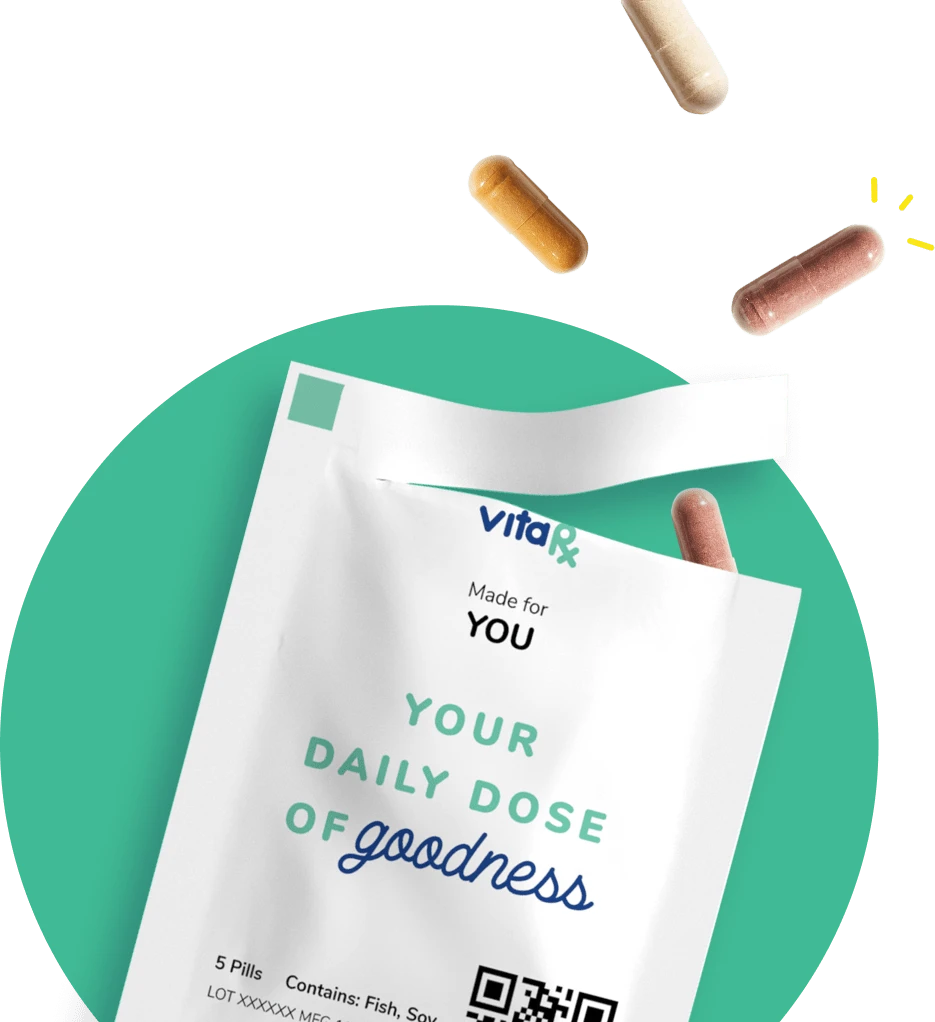Last update: June 11, 2024
Probiotics: The Complete Guide
Discover everything about probiotics in our comprehensive guide. Learn how these beneficial bacteria can improve your gut health, boost your immune system, and contribute to overall wellness.

By Stephanie Wright, RN, BSN
Edited by Dr. Dimitar Marinov, MD, RDN, PhD

Key takeaways
- Probiotics are friendly bacteria that live in your gut
- They are attainable from supplements or in foods like yogurt, kefir, and kombucha
- Potential benefits of probiotics include improved digestion, mood balance, enhanced immunity, and reduced health issues
- Your body naturally hosts its own community of bacteria and other microorganisms; the quantity differs from person to person
- When your gut bacteria is imbalanced, you're more likely to experience digestive issues
What is a probiotic?
Probiotics are live microorganisms that reside in your gut and support overall health. You can consume them through certain types of food, like yogurt or sauerkraut, or supplements.
Probiotics are beneficial for gut health and can contribute to overall well-being, but they are not essential for survival. Your body naturally hosts a diverse community of microbes, including bacteria, that perform necessary functions [1].
Probiotics restore gut balance post-antibiotics
Antibiotics, while effective against bacterial infections, can disrupt the delicate balance of the gut microbiome, leading to side effects like diarrhea. Probiotics can help restore this balance, mitigating the adverse effects of antibiotics.
Can your body produce probiotics?
Your body does not produce probiotics itself. Probiotics are beneficial live microorganisms, primarily bacteria and yeasts, that are similar to those naturally found in the human gut microbiome. However, while the body does not produce these microorganisms, it does provide an environment where they can grow and flourish.
The human gastrointestinal tract, especially the large intestine, is home to a complex and diverse community of bacteria, yeasts, and other microorganisms [2]. This microbiome is established shortly after birth and evolves over time based on various factors, including diet, lifestyle, and environmental exposures.
How do probiotics work in your body?
What are some benefits of probiotics?
Incorporating probiotics into your wellness routine can have potential health benefits. Let's explore these benefits in more detail.
Can reduce bloating and digestive discomfort
Probiotics help balance the gut microbiome, which is essential for healthy digestion. Thus, they may help shift the diversity of the gut microbiome towards a lower prevalence of gas-producing bacteria[5].
Help provide support for skin
Some researchers suggest that there may be a link between gut health and skin health, which is sometimes called the gut-skin axis. Probiotics and gut bacteria may play a crucial role in this axis[6].
Aids in mood support
The gut-brain axis is a well-established pathway through which the gut can influence brain health and mood. The gut microbiota and, consequently, the probiotics that support it may play a role in this by producing and influencing neurotransmitters and other compounds that affect mental health[11].
Assist in boosting immune function
A significant portion of the immune system is located in the gut. Thus, some researchers suggest that probiotics that support gut microbiota may enhance the body's immune response by improving the gut barrier, competing with pathogenic bacteria, and modulating immune system cells.
What are some indicators of imbalanced or insufficient beneficial gut bacteria?
The balance of bacteria in our gut plays a crucial role in overall health, and an imbalance or deficiency in probiotics can lead to various health issues. When the balance of these bacteria is disrupted, it can manifest in various symptoms and health problems. Here is a detailed look at some of the key signs that may indicate a probiotic deficiency or imbalance:
- Bloating and Gas: Excess gas and bloating due to harmful bacteria fermenting food in the gut.
- Abdominal Pain: Discomfort or pain in the abdomen, often caused by an imbalance in gut bacteria.
- Fatigue: General tiredness and low energy linked to poor nutrient absorption due to a disrupted gut microbiome.
- Upset Stomach: Nausea and digestive discomfort indicating an imbalance in the gut flora.
- Diarrhea: Frequent, loose stools resulting from insufficient beneficial bacteria to regulate digestion.
Never self-diagnose
If you feel you may have a deficiency or are concerned or curious about taking this supplement, talk to a doctor or healthcare professional. They can accurately diagnose and recommend the appropriate treatment plan for your specific needs.
Sources of probiotics
Probiotics can be obtained from various sources, primarily from foods but also from supplements when dietary intake is insufficient.
Probiotics-rich in food
Many kinds of friendly bacteria can be found in some of our favorite foods. Some of the most popular probiotic foods include kimchi, sauerkraut, and kefir. Kimchi, a spicy Korean dish made from fermented cabbage, is not only delicious but also rich in healthy bacteria.
Is food intake always the best?
Obtaining probiotics from food is generally recommended. However, in cases of significant deficiency, dietary restrictions, or certain health conditions, supplements may be necessary.
Probiotic supplement formulations
Delivery methods
Probiotic supplements come in various delivery methods, each offering its own set of benefits and ways of consumption. Here's a brief overview of the different delivery methods:
Choose a method that fits your routine
Do not overlook the delivery method. Probiotic supplements come in tablets, capsules, soft gel, chewable, powders, and liquid forms—choose the one that best fits your daily routine to stay consistent.
What to look for in probiotic supplements
When selecting a supplement, several key factors must be considered to ensure you choose a high-quality product that effectively supports your health goals and overall well-being.
Dosage and potency
The dosage of probiotics in supplements varies, so it's important to choose one that aligns with your specific needs. This includes considering your age, gender, and health status, like pregnancy or existing deficiencies. The probiotic formulation can impact its potency and bioavailability, which affects how effectively your body can absorb and use it.
Quantity and delivery method
The delivery method is crucial. Probiotic supplements come in various forms, including tablets, capsules, powders, chewables, and liquid forms. Your choice may depend on factors like ease of swallowing, convenience for traveling, or personal preference regarding taste and texture. Also, evaluate the quantity of probiotics to determine how long it will last based on your daily requirements.
Quality and manufacturing
Quality is paramount when selecting probiotic supplements. Look for products manufactured under strict quality control guidelines and those that have undergone third-party testing for purity and label accuracy. Certifications from recognized bodies can be a reliable indicator of a high-quality product. Additionally, consider the manufacturer's reputation and transparency in their production processes.
How and when should you take probiotics complex for maximum absorption?
To get the most out of your probiotic supplement, it's crucial to consider the timing and method of consumption. The following dos and don'ts offer guidance on optimizing absorption, efficiently supporting your health and wellness, and minimizing potential discomfort.
Do’s
Take with meals or just before. Food buffers stomach acid and can increase the survival of probiotics.
Follow label instructions: Some formulations are designed for specific conditions and times.
Stay hydrated: Drink plenty of water to aid digestion and the activity of probiotics.
Don’ts
Avoid taking with alcoholic beverages: Alcohol can disrupt the balance of gut bacteria.
Don't take immediately with antibiotics; space them out by a couple of hours, as antibiotics can kill probiotics. Individuals with compromised immune systems or those suffering from SIBO (Small Intestinal Bacterial Overgrowth) might find the use of probiotics contraindicated.
Individuals with compromised immune systems or those suffering from SIBO (Small Intestinal Bacterial Overgrowth) might find the use of probiotics contraindicated.
Who should take probiotics?
Taking probiotic supplements has its potential benefits, but it may not be for everyone.
Recommended dosage
The NIH Office of Dietary Supplements does not provide specific dosage guidelines for probiotics due to the vast diversity of probiotic strains and the individualized nature of their use. It's important to note that probiotics are measured in colony-forming units (CFUs), and the appropriate dosage can range from millions to billions of CFUs [8].
Side effects of excessive probiotic consumption
While probiotics supplements are generally safe when taken within recommended limits, excessive intake can have adverse effects:
- Gastrointestinal Symptoms: Overuse of probiotics can cause digestive discomfort, including gas, bloating, and constipation or diarrhea, especially when beginning a new supplement or significantly increasing the dosage.
- Risk of Infection: In immunocompromised individuals or those with underlying health issues, high doses of probiotics may increase the risk of bacterial or fungal infections.
- Allergic Reactions: Probiotic supplements may contain allergens, posing a risk to individuals with specific allergies.
Always consult your doctor
If you're experiencing side effects, consult your healthcare provider. They may recommend a different probiotic formulation form or adjust your dosage. Balancing probiotic supplement needs with any discomfort is crucial and should not be overlooked.
Health made easy: your go-to resource for essential vitamins and supplements
Frequently asked questions about probiotics (FAQ)
Our library of expert-authored articles covers just about every question you might have about vitamins, minerals, and supplements — along with some you might not have known you had.
Final thoughts
Probiotic supplements pack a punch when it comes to supporting your gut health and overall well-being. They also play a role in keeping your immune system strong and even support mental health. While you could get your healthy bacteria from foods like yogurt and sauerkraut, taking probiotic supplements ensure you're getting a concentrated dose of these beneficial microorganisms.
Sources and references
- Microbiome definition re-visited: old concepts and new challenges - PMC
- Gut microbiota in gastrointestinal diseases - ScienceDirect
- Journey of the Probiotic Bacteria: Survival of the Fittest
- Probiotics: friend or foe to the human immune system | Bulletin of the National Research Centre
- Probiotics in Irritable Bowel Syndrome: A Review of Their Therapeutic Role - PMC
- The Role of Probiotics in Skin Health and Related Gut–Skin Axis: A Review - PMC
- Probiotics: What is it, Benefits, Side Effects, Food & Types
- Probiotics - Health Professional Fact Sheet
- Probiotics in Food Systems: Significance and Emerging Strategies Towards Improved Viability and Delivery of Enhanced Beneficial Value
- Probiotics: What You Need To Know | NCCIH
- Probiotics may help boost mood and cognitive function - Harvard Health
Author

Stephanie Wright
Stephanie brings over 13 years of diverse nursing experience to the table, having honed her expertise in critical care, mental health, and utilization management. Her journey as a registered nurse across these various healthcare sectors underscores her adaptability and deep commitment to patient care.
Fact checker

Dr. Dimitar Marinov
Dr. Marinov has years of experience in scientific research and preventive and clinical medicine. His publications in peer-reviewed journals are on nutritional status, physical activity, and musculoskeletal disorders among adolescents.
At VitaRx, we're not just passionate about our work — we take immense pride in it. Our dedicated team of writers diligently follows strict editorial standards, ensuring that every piece of content we publish is accurate, current, and highly valuable. We don't just strive for quality; we aim for excellence.
Related posts
While you're at it, here are some other relevant articles you might be interested in.

Get your personalized vitamin recommendations in less than 3 minutes.
Get your personalized vitamin recommendations in less than 3 minutes.











